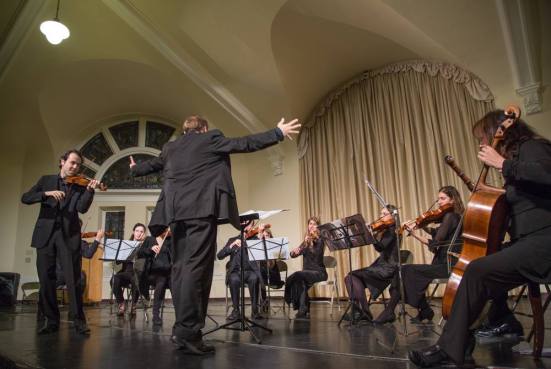The American Baroque Orchestra makes its Cape Cod debut on Sunday, June 19, with “Fathers and Sons,” a program of baroque and classical masterworks composed by father/son composer pairs. The historically informed performance will be played on authentic period instruments. The concert takes place at 5 PM at St. Barnabas Episcopal Church, 91 Main Street, in Falmouth.
The 12-member American Baroque Orchestra offers music lovers a unique way to celebrate Father’s Day. Highlights include music by Wolfgang Amadeus Mozart and his father Leopold, Alessandro Scarlatti and his son Dominic, and Johann Sebastian Bach and his son Carl Philip Emanuel.
“The program explores how fathers, through musical interaction, passed down an artistic legacy from one generation to the next,” said conductor Mark Bailey, who is founding artistic director of the orchestra and extensively involved in the performance of baroque, classical, and early romantic instrumental, vocal/choral, and operatic works.
“There is considerable similarity in the works by father and son,” said Kevin Sherwin, associate artistic director. “Mozart, for instance, learned everything from his father. Yet, there is also a contrast; the music of the son is often more rebellious; the music of the father, more conservative.
“Often, one member of the pair is much better known to the public than the other,” said Sherwin. “Yet the compositions of both are absolutely amazing, and I think the audience will enjoy both the well-known and the lesser-known works.”
History remembers composers somewhat variably, Sherwin explained. C.P.E. Bach was actually more popular than his father when he was alive, but their positions have reversed over time.
Jacques Lee Wood, principal cellist for the ABO, will play C.P.E. Bach’s Cello Concerto in A Minor, the earliest of his three cello concertos. Written in 1750, the work has been described as majestic and expansive. Several passages recall his father’s Six Suites for Unaccompanied Violoncello; his use of chromaticism and certain melodic phrases also remind one of J.S. Bach’s work.
Noted for his expressive warmth, sensitivity, and technical ease, Wood has won numerous competitions and has performed extensively throughout the US, Canada, Europe, and Asia. He plays baroque and modern cello in numerous chamber ensembles and baroque orchestras.
The orchestra will also perform J.S. Bach’s elegant and moving “Air on a G String,” from his third Orchestral Suite, and Wolfgang Amadeus Mozart’s “Salzburg Divertimento,” one of three he composed in Salzburg in 1772 when he was 16, after returning from a trip to Italy. It is said that he captured the sunny Italian spirit in these entertaining diversions. Leopold Mozart is represented by his “Hemiola” Minuet, which Sherwin described as “a really fun piece.”
The American Baroque Orchestra uses the term “baroque” to indicate an approach—or a way of exploring, thinking about, and interacting with music, as much as referring to a specific period of time and genre in music, generally considered to be 1600 to 1750.
“Playing on period instruments according to the composer’s expectations creates an energy and vitality that brings particular depth of meaning to the music,” said Bailey, who also plays period viola. “The vibrancy that the ABO brings to its performances allows listeners to feel they are part of the music-making.”
Period instruments are reconstructions of instruments from the Baroque period. The size and shape of period violins, for instance, are different from modern violins, and they are played without chin rests or shoulder rests. Gut strings are used and the bow is shaped differently. Baroque cellos are played without endpins. A violone, or large viol, is an instrument like a string bass, but with a different shape and a sweeter, more gentle sound. Sherwin plays the baroque guitar, which is smaller than a modern classical guitar and has two strings for every one string on a contemporary guitar, creating a type of reverberation effect.
The end result is a more intimate sound than can be achieved with modern instruments. “Baroque music captures intense emotions in a really pure form,” said Sherwin. “From excitement to drama to joy to sadness, it really tells a story.”
The American Baroque Orchestra is based in New Haven and includes musicians from New York and Boston. It performs throughout New England. “We are pleased to bring the ABO to Falmouth, with the assistance and support of Fritz and Laura Sonnichsen of the Falmouth Chamber Players Orchestra,” said Bailey.
The musicians met when Bailey attended an open reading session held by the FCPO a few years ago. Mr. Sonnichsen, a baroque music enthusiast, immediately noticed Bailey’s baroque viola, and a close friendship was born. “The ABO is a first-rate orchestra, made up of immensely talented players who love and appreciate the genre,” said Ms. Sonnichsen. “We are thrilled to have a part in bringing this exquisite music to Cape Cod.”
Tickets are $20 in advance from the American Baroque Orchestra website at americanbaroqueorchestra.com or $25 at the door. Student tickets are $5. For more information, email info@americanbaroqueorchestra.com.

